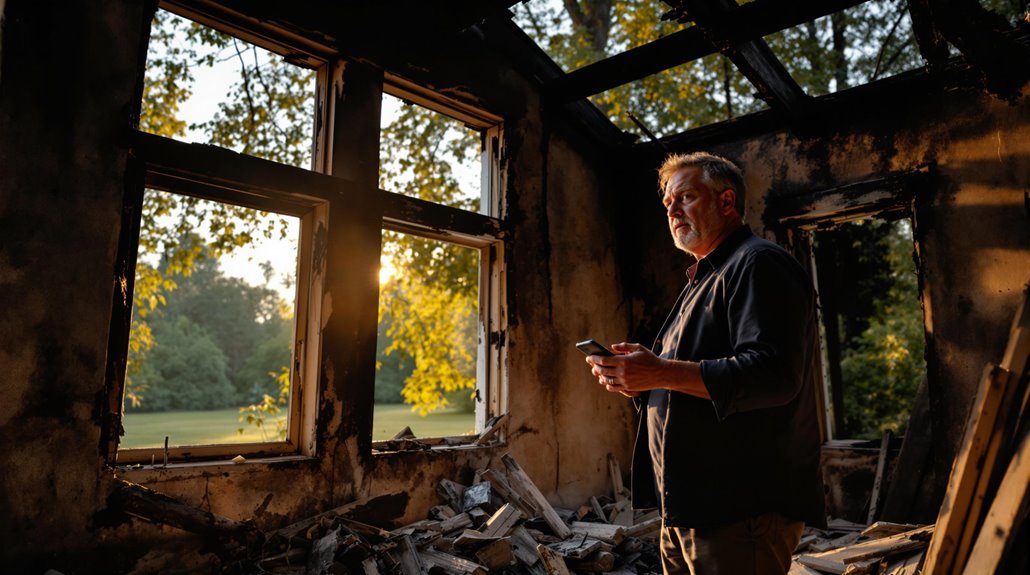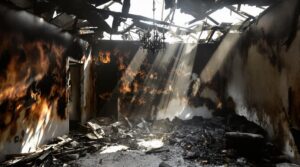Request an advance on your claim and initiate it promptly by contacting your insurance agent. Compile a detailed inventory of your losses, including descriptions and value of items. Protect your property from further damage and document any repairs. Track living expenses and guarantee to continue paying your insurance premiums. Keep the claim open until fully resolved and consider hiring a public adjuster. Understanding your coverage prevents potential issues. There's further insight available for consideration.
Key Takeaways
- Promptly file your claim and provide all necessary documentation, including a police report and detailed fire account.
- Keep a comprehensive inventory of losses with descriptions, purchase dates, and approximate values, supported by photos and receipts.
- Track all living expenses diligently for reimbursement under the policy's loss of use clause.
- Secure the property against additional damage and document all temporary repairs for insurance purposes.
- Review insurance policy details, including coverage exclusions and deductibles, to understand your financial responsibilities.
Request an Advance on Your Claim
Requesting an advance on a fire insurance claim can be an important step for policyholders facing immediate financial needs after a house fire. This strategy provides significant relief by addressing urgent needs such as temporary living expenses and essential purchases. Insurance companies often permit advances within the fire insurance claim process, allowing access to funds that can ease the strain of displacement. These advances are typically deducted from the final settlement, making it essential for policyholders to meticulously track received amounts. Working with public adjusters can help maximize advance payments and ensure fair compensation throughout the claims process. To successfully request an advance, presenting thorough documentation is critical. Evidence of urgent needs, such as hotel invoices and receipts for necessary items, can substantiate the request, potentially expediting approval. Engaging promptly with the insurance adjuster also plays a key role in accessing funds more swiftly. By taking these steps, policyholders can navigate the financial challenges following a house fire with greater ease, ultimately aiding in their recovery process.
Compile a Comprehensive Inventory of Losses
After securing an advance on an insurance claim, the next step involves compiling a thorough inventory of losses. A detailed inventory is vital in fire insurance claims, as it meticulously documents all personal belongings affected. Begin by creating an inventory list that details descriptions, purchase dates, and approximate values of items. This list should encompass damaged items, including those affected by smoke or water, which are often covered by the policy. Support this documentation with photographs and videos to visually capture and document losses. Proof of purchase, such as receipts for high-value items, should be included to expedite the claims process and validate the inventory list. Maintaining and regularly updating this inventory in a secure location is important, providing a proactive approach to potential future claims. This meticulous preparation guarantees a structured, efficient claim process, thereby serving the claimant's needs thoroughly and effectively. Consider working with public insurance adjusters to maximize settlement amounts and ensure fair compensation for all documented losses.
Initiate Your Claim Promptly

Initiating a fire insurance claim promptly is essential for guaranteeing a smooth and efficient reimbursement process. Immediate contact with a home insurance agent can greatly expedite financial recovery. Filing the claim without delay allows for a more organized submission of necessary documentation, such as details of the damages, the incident date, and any injuries sustained. Providing a police report and a detailed account of the fire's cause is fundamental, aiding the insurance adjuster's thorough evaluation of the claim. Working with public insurance adjusters can increase settlement amounts by up to 500% for non-catastrophe claims. Most insurance companies offer 24-hour claims assistance, facilitating the quick reporting of incidents and potentially hastening processing times. An adjuster will be assigned to assess the damages, making it imperative for claimants to maintain consistent communication and be present during evaluations. This proactive involvement guarantees that all damages are accurately reported and increases the likelihood of a fair settlement. Prompt initiation of the claim is a key step toward achieving financial recovery.
Protect Your Property From Additional Damage
Following a house fire, it is essential to take immediate steps to protect the property from additional damage. Property owners should secure their home by boarding up windows and covering roof holes with tarps. This not only prevents weather-related damage but also deters unauthorized access. It is vital to document all temporary repairs; retaining receipts will aid in insurance reimbursement. Relocating items at risk of further damage to safer locations is advisable to prevent potential hazards. Regular inspections of the property are necessary to identify new issues, such as leaks or vandalism, since insurance policies typically do not cover unsecured properties. Engaging licensed mitigation companies can be beneficial in properly restoring the property and minimizing further damage. Insurance policies require policyholders to take reasonable care to mitigate losses, ensuring that all protective measures are well-documented and aligned with policy stipulations is vital for a successful claim. Before taking any action to protect your property, ensure you have received fire department clearance to safely re-enter the premises.
Track and Document Your Living Expenses

In the aftermath of a house fire, maintaining thorough records of living expenses is essential to guarantee proper reimbursement under the loss of use clause in an insurance policy. Individuals should meticulously keep detailed receipts for meals, lodging, and other necessary expenditures, organizing them by category and date to facilitate efficient submission to their insurer. In addition, submitting these documented expenses promptly can greatly expedite the reimbursement process, highlighting the importance of proactive financial management during displacement. Working with a public insurance adjuster can help maximize settlement amounts for displaced homeowners seeking fair compensation for their living expenses.
Keep Detailed Receipts
Meticulous record-keeping is essential when tracking and documenting living expenses after a house fire. To effectively manage this, individuals should keep meticulous records of all expenses related to temporary housing and additional living expenses incurred during displacement. Organizing and retaining receipts is vital as they substantiate your claim for reimbursement under your insurance policy. Familiarity with the policy's loss of use clause can guide in understanding eligible expenses. Working with a public insurance adjuster can increase claim settlements by 30-50% through proper documentation of expenses.
| Expense Type | Importance |
|---|---|
| Temporary Housing | Provides proof of incurred cost |
| Meals | Validates additional expenses |
| Transportation | Supports travel-related claims |
| Utilities | Confirms ongoing service costs |
| Miscellaneous | Captures all other essentials |
Using tools such as spreadsheets or apps can streamline this process, ensuring that all documentation is accessible and organized for insurance submission.
Itemize Temporary Costs
Thorough documentation of temporary costs is essential for individuals maneuvering the aftermath of a house fire. To effectively itemize temporary costs, consider the following steps:
- Document Expenses: Keep detailed receipts for all temporary living expenses, including lodging, meals, and transportation, which can be reimbursed under the loss of use clause in your insurance policy.
- Organize Systematically: Utilize a spreadsheet or expense tracking app to categorize and organize expenses, facilitating a clear presentation when seeking reimbursement.
- Track Dates and Amounts: Record the dates and amounts for each expense to substantiate claims for additional living expenses.
- Note Cost Increases: Differentiate between necessary and extraordinary expenses, noting any increases in costs compared to normal living situations for thorough documentation.
Implementing an organized system guarantees efficient claims processing. Working with licensed public adjusters can significantly increase your chances of receiving fair compensation for temporary living expenses during the recovery period.
Submit Expense Records
After effectively itemizing temporary costs, individuals must focus on the submission of expense records to guarantee proper claim processing. This involves tracking all living expenses incurred during displacement, such as lodging, meals, and essential items. These costs may be covered under the insurance policy's loss of use clause. Maintaining a meticulous record of receipts is vital for facilitating reimbursement and ensuring fair compensation. Organizing these records in a dedicated folder or binder, categorized by type (e.g., housing, food, transportation), streamlines the claims process. Additionally, documenting daily expenses related to the new living situation is essential, as many policies cover increased living costs beyond previous expenses. The accurate submission of these records maximizes claim payouts and effectively supports those affected. Similar to roof damage claims, policy compliance requirements must be followed to avoid penalties and maintain eligibility for future claims.
Obtain Accurate Repair Estimates
Securing accurate repair estimates is a crucial step in the house fire insurance claim process, as it lays the foundation for a fair settlement. To obtain accurate repair estimates, follow these essential steps:
- Engage Licensed Contractors: Obtain multiple estimates from licensed contractors. This guarantees a fair comparison of costs and services, which can greatly impact the insurance settlement process.
- Document Estimates Meticulously: Each estimate should include the scope of work, materials, and labor costs. This documentation provides clear evidence of necessary repairs, including smoke damage, to your insurance company.
- Consider Hidden Damages: Confirm estimates account for all damages, including those not immediately visible, such as smoke and water damage, which may require professional assessment.
- Maintain Communication Records: Keep detailed records of all communications with contractors and insurance adjusters. These records can expedite the claims process and support your position during negotiations, facilitating smoother insurance claims processes.
This approach guarantees thorough preparation for the insurance settlement process. Effective communication between the homeowner, contractor, and insurance adjuster significantly enhances the likelihood of claim approval.
Continue Paying Your Insurance Premiums

In addition to obtaining accurate repair estimates, maintaining consistent insurance premium payments is vital during the house fire insurance claim process. Securing continuity in coverage is important, even if the insured is not currently residing on the property. Failure to continue paying your insurance premiums can result in a lapse in coverage, increasing the risk of future claims denials. Most policies stipulate that premium payments must persist after a loss, so it is advisable to thoroughly review the policy. Additionally, documenting all premium payments made during the claims process serves as evidence of compliance with policy requirements. This documentation is significant for avoiding disputes regarding coverage validity. Regular verification of up-to-date payments is necessary to prevent unexpected issues that could complicate the claims process. By remaining diligent in managing premium payments, one can safeguard against potential pitfalls and facilitate a smoother resolution to the insurance claim. Consider bundling multiple insurance policies since insurance policy bundling can provide substantial savings while maintaining comprehensive coverage during the claims process.
Keep Your Claim Open Until Fully Resolved
While maneuvering through the complexities of a house fire insurance claim, it is crucial to keep the claim open until it is fully resolved. This approach allows for the identification of additional damages that may manifest after the initial assessment. Here are key considerations:
- Thoroughness: Keeping the claim open guarantees all damages are documented extensively, preventing overlooked items from being excluded from compensation.
- Insurance Policy Terms: Review the terms regarding claim closure. Many policies permit claims to remain open for extended periods, facilitating detailed documentation of losses.
- Settlement Checks: To maintain the option for future claims, cross out any closure language on settlement checks. This action can protect against premature claim closure.
- Public Adjuster Consultation: Engage a public adjuster if there's uncertainty about the claim's completeness. They can advocate for keeping the claim open until all potential damages are addressed effectively.
Consider Engaging a Public Adjuster

Many homeowners find that engaging a public adjuster can considerably enhance the outcome of a house fire insurance claim. These licensed professionals represent policyholders to negotiate fair settlements with insurance companies. Public adjusters typically charge a fee between 9% and 15% of the final settlement amount. However, their involvement often results in higher compensation, which can offset the fee. By streamlining the claims process, they manage all communications with the insurer and guarantee that damages are thoroughly documented and accounted for.
Public adjusters' expertise is invaluable when evaluating damages and interpreting complex fire insurance policies. Their knowledge helps policyholders avoid common pitfalls, such as hastily settling or missing vital damages that could affect the settlement amount. Engaging a public adjuster early in the claims process is advantageous, as it guarantees a thorough approach to handling claims, ultimately serving the homeowner's best interest by maximizing potential recovery.
Understand Your Coverage to Avoid Coverage Loss
To effectively manage a house fire insurance claim, it is essential to thoroughly understand the policy's exclusions and deductibles. Analyzing the exclusions helps identify items or scenarios that are not covered, which can prevent unexpected denial of claims. Additionally, understanding the deductibles is vital, as these determine the initial financial responsibility before the insurance coverage takes effect.
Identify Coverage Exclusions
Understanding the exclusions in a fire insurance policy is essential for policyholders to safeguard against unexpected coverage loss. Homeowners insurance may contain specific coverage exclusions that limit protection, such as neglect or lack of maintenance. Property owners should:
- Review the policy for exclusions related to natural disasters like earthquakes or floods, which standard fire insurance typically does not cover.
- Assess personal property coverage to identify limitations on high-value items, which may require additional riders for full protection.
- Distinguish between actual cash value (ACV) and replacement cost coverage, as ACV policies deduct depreciation, affecting compensation.
- Verify the inclusion of a "loss of use" clause, guaranteeing coverage for additional living expenses if the home becomes uninhabitable due to fire damage.
Careful scrutiny helps guarantee extensive protection.
Review Policy Deductibles
After identifying coverage exclusions, it becomes important for policyholders to examine their insurance policy's deductibles to fully comprehend their financial responsibilities in the event of a claim. Understanding the deductible is essential as it determines out-of-pocket expenses before fire insurance covers the rest, impacting the claim payout. Homeowners insurance policies often feature different deductibles for various coverage types, requiring thorough review to anticipate financial obligations. Higher deductibles may lower premiums, yet they can result in financial strain if a claim arises. Distinguishing between flat and percentage deductibles is significant, particularly during catastrophic losses. Regularly reassessing deductibles in light of one's financial situation and home value guarantees sufficient coverage, minimizing potential losses and fostering informed decision-making for homeowners.
Frequently Asked Questions
How Do I Maximize My Fire Claim?
Investigating the truth of maximizing fire damage claims involves understanding the claim process. Key elements include thorough documentation tips, engaging with an insurance adjuster, accurate loss assessment, understanding policy limits, and effective claim negotiation to guarantee ideal compensation.
How to Maximize Insurance Payout?
To maximize insurance payout for fire damage, one should meticulously follow the claim process, ensuring thorough documentation of losses. Secure repair estimates, understand policy coverage, request emergency funds, and consider engaging an insurance adjuster for ideal settlements.
What Not to Say in a Home Insurance Claim?
In home insurance claims, avoid speculative claims and unfounded assumptions to prevent claim denials. Misrepresentation risks arise from emotional statements or discussing financial struggles. Underreporting damage and incomplete documentation also jeopardize accurate compensation assessments.
What Is the 80% Rule Regarding Fire Insurance?
In the age of disco, understanding fire coverage basics is essential. The 80% Rule mandates insuring at least 80% of replacement cost, impacting insurance policy limits, deductible impact, and claim filing process, while emphasizing loss documentation tips.








